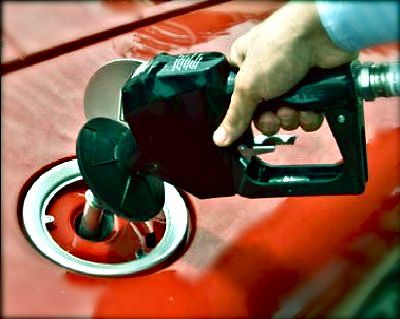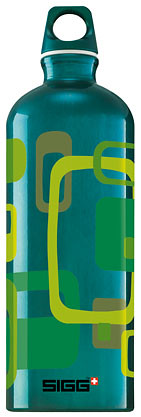Green Your Ride
Green Your Ride
16 ways to unlock your vehicle's greener side
Wheeling and dealing:

Do This: Snag a rebate on a hybrid.
Why: Federal tax rebates phase out over time.
Check irs.gov/newsroom for updates on models that get you cash back.

Do This: Get fuel savvy.
Why: If you log 12,000 miles per year, a 35-mpg cruiser will save you $900 (at $3.20 per gallon) over a 20-mpg guzzler. Get gas stats on all rides at fueleconomy.gov.

Do This: Consider your commute.
Why: Hybrids are best in stop-and-go city traffic, but uber-efficient cars like the Toyota Yaris and MINI Cooper are more cost effective on the highway.
At the helm:
Do This: Stop idling.

Why: Idling 5 fewer minutes per day saves 20 gallons of gas per year.
Fact: Restarting does not waste gas or increase wear.

Do This: Enjoy the ride.
Why: Driving 65 in a 55 mph zone decreases gas mileage by 15 percent. Every 5 mph over 60 mph costs you an additional $0.20 per gallon.

Do This: Resist "Topping off" you gas tank.
Why: The compartment where you insert the nozzle is designed to catch vapors from the tank and help prevent them from being released into the atmosphere and contributing to pollution and smog. Overfilling your tank causes gas swills into this container and prevents the recovery of the fumes. Plus, any spilled gas will pollute the air when it evaporates, especially in warm weather.

Do This: Choose Octane Wisely
Why: Not all cars perform better or run more efficiently on premium gas. The impact of high-octane fuel isn't just on your wallet, but also on the environment. Unless your car is specifically requires high-octane fuel (such as high-performance, turbo-charged, 12-cylinder engines), it may actually cause more emissions and pollution.

High-octane fuels require more refining, which causes more pollution, and may not burn entirely, leaving deposits in the engine that will make it run less efficiently and generate more emissions. According to the EPA, "Unless your car needs high-octane gasoline, use of "premium" will not improve performance or emissions - it will just cost you more."

Do This: Hyper-mile
Why: maximize gas efficiency using basic driving techniques: reduce quick deceleration and acceleration (ie: braking and flooring it) - Increase your MPG by up to 35 percent! Here's a good visual: drive as if there's an egg under the gas pedal.

Do This: Fuel up early am or later pm
Why: Fill your vehicle's tank early in the morning or in the evening when it's cooler. Getting gas during the day when temps are high causes fuel to evaporate at a faster rate. Since dispensing fuel into your tank is not an air-tight relay, inevitably some fuel fumes escape. Sure, it's not going to make much of a dent in your fuel costs, but it does reduce the amount of vapor you huff while you're pumping, and keeps smog and pollution-forming fumes from being released into the atmosphere.

Do This: Score cheap gas.
Why: Map the quickest route to the cheapest pumps with gasbuddy.com. Savings could net you about $50 a year.

Do This: Stay tuned.
Why: All your green intentions go down the drain without a good wrench to monitor your hood-poorly tuned engines waste 10 to 20 percent more fuel than those humming with attention. Check out recommended garages near you at cartalk.com/content/mechx.

Do This: Lose the rack.
Why: You can waste the equivalent of two full tanks per year from roof rack-drag. Remove it post-season, or add a streamlined fairing.

Do This: Roll high.
Why: Properly inflated tires boost gas mileage by 3 percent, increase safety, and extend tire life. (And we still never check it.) Pick up a Slime Digital LED Gauge ($10, autozone.com), check the tire's sidewall for the recommended PSI, and top it off once a month.
Do This: Stay Fresh Inside
Why: Driving may be hazardous to you health. Not just because fellow drivers are TWD (texting while driving), but because the air both inside cars (from off-gassing synthetic materials) and outside cars (from exhaust) is generally concentrated with pollution. A keen way to keep the air in your car fresh and breathable is to scout out a nifty little device called an ionizer and plug it into the car's cigarette/accessory outlet. These ion wizards silently purify the air by generating negative ions, which BTW are naturally produced by falling water and may be related to why close proximity to crashing waves and waterfalls feels so good. Negative ions are basically oxygen molecules that have gained one or more extra electrons that attract air-borne particles and pollutants (kind of like static electricity) causing them to clump up and become heavy enough to fall to the floor. Next time you take a deep breath when someone cuts you off, at least the air will be fresher.

Chrome Mini Ionizer by Roadpro

Do This: Dodge plastic water bottles in a sun-drenched car

Why: While the scandalous question of whether drinking water from plastic bottles left in a sun-heated car increases the cause of breast cancer remains an open forum, it seems pretty clear that it's not a good idea. PET (or PETE) #1 plastic (used to make single-use beverage bottles) contains unsavory additives such as phthalate plasticizers, which have shown to leech into food and drink, especially when heated, and may disrupt hormones. Not very refreshing. Instead of going without hydration on the go, tote along a reusable stainless steel bottle instead. They're virtually indestructible and available in your choice of sprightly or subdued colors and motifs.

Check out Kleen Kanteen, New Wave Enviro, or Sigg.
??
The End of the Road:

Do This: Donate your beater.
Why: Non-profits get proceeds from selling it; you get a tax write-off. Try Habitat for Humanity's Cars for Homes program or NPR (National Public Radio)
Q + A
Going green is simple and smart.
Women's Health eco-guru Renée Loux shows you how.
Send her your earthly concerns.


Q: When I wash my car at home, the suds go down the storm drain. Is that bad? –Carly R. Rochester, NY
Yep. Some drains lead directly to rivers and oceans without passing through treatment plants. Untreated wastewater contains residue from oil, gasoline, and exhaust that can kill animals and sicken humans. Wash vehicles on grass (AND USE A BIODEGRADABLE SOAP - LIQUID DISH SOAP IS A STELLAR CAR CLEANER): The soil naturally filters out contaminants.
Q: What's better for your car-fresh air or AC? –Alexis E. Stowe, VT
It depends. For tooling in traffic, go with fresh air. Yes, it'll be hotter, but you're making a statement! For the highway, hit the AC. Open windows cause drag and at higher speeds your engine runs more efficiently so the drain on your mileage is less.
Q: I've heard that lawnmowers are bad for the environment-is that true? –Cora C., Devon, DE
If you're talking about standard gas-powered lawnmowers, then yes, it's true. They are big-time polluters: When it comes to emissions, mowing your lawn for one hour is the equivalent to driving a compact car from Boston to New York (about 200 miles). Blame their inefficient, 2-cycle engines-they spew as much as 25 percent of the fuel as exhaust, and that sends a cloud of smog-causing hydrocarbons, particulate pollution, and global-warming carbon dioxide into the air. Blech. Try mowing less frequently (longer grass makes for a healthier lawn-3 to 4 inches is ideal) and changing your mower's oil regularly. If you're updating an old model, consider a quiet, emission free electric mower (like the Homelite; homedepot.com) or a push-reel manual mower-they're easy to push and great for hard-to-navigate sections of lawn (planetnatural.com).
Tagged: smart (green) living smart tips
